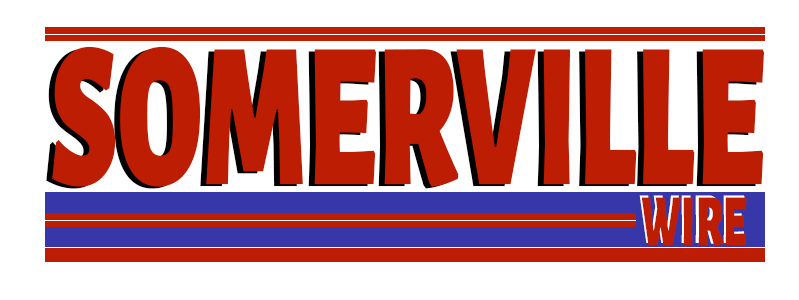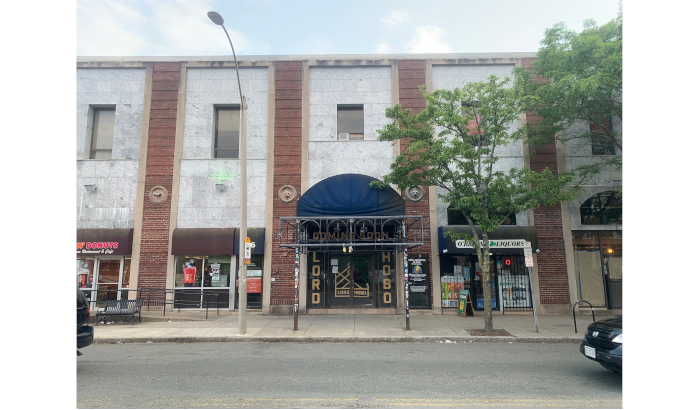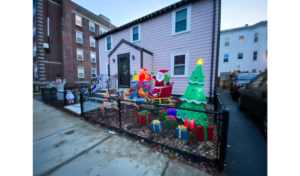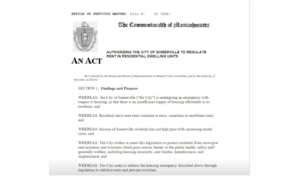As venues and studios pushed out by pandemic economy, developers
(Somerville Wire) – Somerville’s cultural workforce is used to scraping by. The question is how long that can last, as the music ecosystem crumbles and arts studios face looming development. Zoning could make development more arts-friendly, but affordability remains a pressing concern.
“We are at an absolute crisis of losing arts spaces and we need to act now,” City Council President Ben Ewen-Campen said. “We’re many years into the crisis and when I get called about some studio building facing a risk, it’s still a nightmare every time—we still don’t have the capacity to respond effectively. We need more staff and resources.”
Major artist spaces like Central Street Studios and Washington Street Art Center have had brushes with closure due to changes in ownership or rent increases.
Today, the cycle and dependency on goodwill of landlords is wearing on artists.
Dan Coughlin is a tenant at Joy Street Studios. New York developer, North River, purchased the Joy Street building and surrounding properties a few years ago. The developer just finished construction on a lab space next door. “You just kind of worry, you don’t know what their intentions are. There has been talk that the building will be redeveloped some time in the future, but [developers] have committed to keeping us in the neighborhood in some capacity,” he said. Tenants at Joy Street are one of many buildings currently working with the Art Stays Here coalition to identify local stakeholders and organize in advance of any threat of displacement.
Somerville’s music scene faces an even grimmer situation. The pandemic saw the shuttering of iconic local music venues like ONCE and Bull McCabe’s and regional mainstays like Allston’s Great Scott. JamSpot, a rehearsal space that accommodated louder rock groups, closed in June of 2019. Recording studios like Pink Noise and Q Division have since moved out of the city.
Over 3,000,000 square feet of Somerville arts space is subject to significant development pressure, according to the 40-page Arts Space Risk Assessment Report produced by the Metropolitan Area Planning Council and the City of Somerville.
The report contains guidelines on how to save and grow Somerville’s cultural workforce. Heeding the recommendations of the report, the City will produce a Cultural Capacity Plan by the end of 2023, which includes the groundwork for an arts space stabilization fund and arts-focused zoning to cultivate and protect Somerville’s arts. The SAC’s new Arts Development Manager, Michael Rosenberg, is implementing the report’s recommendations, starting with zoning to set aside five to ten percent of up and coming commercial floor space for “arts and creative enterprise use. That process begins with refining “arts and creative enterprise” zoning definitions to accommodate local needs, but challenges remain beyond securing spaces.
“Spaces being set aside don’t have affordability restrictions. So what I’ve seen artists call for is a program to essentially build up a fund for purchasing and running spaces in the City,” Ewen-Campen said. That’s the arts space stabilization fund the report recommends.
Rosenberg agreed, adding, “For spaces that come out to only a couple hundred square feet, [a buy-out] would be a great option. That money would be better used elsewhere in the community.” He said an arts space stabilization fund is “being considered” but the City is waiting on funding and contractor availability for a study.
Needing Funds
What Somerville is working toward is similar to the Boston Arts and Business Council’s Creative Campus Initiative. But according to the Arts Space Risk Assessment Report, implementing a stabilization fund could take up to a decade. In the meantime, artists and musicians face an uphill battle with securing spaces and demonstrating financial viability on their own.
“Developers aren’t interested in leasing to local artists, they would rather ensure commercial viability by bringing in outside operators that pander to national touring acts. If you’re someone who’s looking to open a small independent space, [landlords and developers] are skeptical about your ability to pay rent. That’s why the City should pursue this stabilization fund, and maybe look into something like small business assistance if a venue goes under,” said Sam Epstein, founder of the Jungle, a “community music club” in Union Square.
He started his independent venue in 2019 with the help of pandemic-related funds, but that money just ran out. Now the venue is surviving off of a cycle of loans that he pays off during the venue’s busier months. The way things are now—he just received a $32,000 insurance bill—he doubts that more independent venues will pop up.
Epstein attended the May 10 meeting with the Mayor to discuss challenges facing the music community—only after he found someone to cover for him.
“I’m not a politician, I don’t do advocacy. I’m running open mics, fixing the ice machine, cooking food, doing all the work it takes to keep this operation going. It takes time to do advocacy and get legislation passed. This country isn’t about providing free money for artists. I can’t stand by issuing thoughts and prayers to politicians.”
On the Move
Originally a brick and mortar venue, ONCE left its space at the outset of the pandemic. Now it’s an “itinerant” production company that hosts events across the city’s parking lots, fields, and remaining venues.
ONCE owner, JJ Gonson runs her catering company Cuisine en Locale by day to pay the bills. “You know what’s good about the food service?” Gonson said. “It allows you to leave whenever you want to go on tour. That’s why so many of us musicians are in the service industry,” she said.
“I couldn’t stay in that perfect space,” Gonson said about ONCE’s location on Highland Avenue. “There was no way once we stopped having shows during the pandemic—and stopped receiving revenue—that I could get out from the burden of that rent. It was just going to eat me alive. And I wouldn’t be able to get back in at this point.”
Since relaunching ONCE, her goal has been to break even on events after paying artists and other expenses. But even without the overhead of a space, that’s never happened. “ONCE loses money on everything. We haven’t made money on a show since we started doing production,” she said. “There are two ways to make money as a venue: booze and exorbitant ticket costs. We don’t do that.”
Gonson is a veteran of the local music scene and the vice president of the New England Chapter of the National Independent Venue Association. Still, she said, she would need a lot of support getting into a space. “That kind of support could include legal assistance, help with licensing, financials,” she trailed off. “I can only speak for myself, but I’ve opened enough businesses to say everything I do is new learning.”
Giovanni Duran is the Program Director at Bridgeside Cypher, another music organization that stays on the move. Bridgeside holds monthly hip-hop circles, called cyphers, usually in the graffiti alley in Cambridge and skateparks around the region.
“We decided to hold events outside because of the prejudice against hip-hop in most venues,” Duran said. “It’s highly difficult for someone to book spaces as a hip-hop performer. Venues can ignore booking inquiries and I’ve been aware of a few occasions in which R&B artists haven’t been paid after packing a venue.” Duran did not want to disclose the venue names.
“The biggest thing that we offer people is an affirmation. Music space can be predatorial, especially for self-taught artists. Sometimes owners are either just looking to get money off you. We offer people a safe space to come to and no matter how good you are, as long as you have the courage to perform, we’re cheering you on. We want people to win and when approaching venue owners, have a bit more leverage.”
A Cambridge-based organization, Duran says he hopes more musicians in Somerville will take note of Bridgeside and implement similar outdoor programming to meet their needs.
“We have so many prestigious schools in the area and yet I don’t feel like there’s a pipeline to the industry in this region, which I don’t understand. There’s a gap between the people in schools and the local talent. We try to bridge that gap by providing an open forum for students and locals to come together and appreciate one another on a musical level. This isn’t a group of insiders or a cool kids club, it’s open to everyone. We value solid character, humility, and kindness.”
Looking for space
“One of the problems that’s frustrating for me is when spaces pop up, the groups are not prepared,” said Thalia Tringo, a local real estate agent. “They need financing in place, a letter of intent, demonstrated viability as a business … It would be great if the city had some sort of workshop that helped people get everything together so they know how to write a letter of intent and be ready to go when the next opportunity comes up,” Tringo said.
Gonson said she’s experienced those challenges first hand. She recalled speaking with the Planning Board, speaking in circles for three weeks because parties were misinterpreting words. “It was merely using different words and not understanding what constituted a plan to one party, did not match the other party’s understanding, and vice versa. Planning folks have been very gracious in dealing with us, but if somebody existed who could kind of mediate, I think more businesses would find ways of enlivening spaces in a way,” Gonson said.
Still, between the Arts Council and the Economic Development Division, arts mavens have found allies in City government and located some resources for their small businesses.
“The machine of the City is actually very supportive. I feel like if there were spaces, the people at the City would help make it happen,” Gonson said. “We are super fortunate to live in a city where the people who are in charge are even thinking about the arts. At the end of the day, the City is going to follow money wherever it can, so they’re in a tricky position. But for that reason, I think the arts have to be very heavily subsidized. They’re as critical to the pleasantness of a place as parks, playgrounds, libraries—you need nightlife, you need liveliness,” she said. “Somerville is a quirky place that is being dangerously un-quirked.”
This article is syndicated by the Somerville Wire municipal news service—a project of the IRS 501(c)(3) tax-deductible nonprofit Somerville Media Fund.
All Somerville Wire articles may be republished by community news outlets free of charge with permission and by larger commercial news outlets for a fee. Republication requests and all other inquiries should be directed to somervillewire@somervillemedia.fund.
SUBSCRIBE TO THE SOMERVILLE WIRE EMAIL NEWSLETTER: http://eepurl.com/hX3alr
Check out all our social media here: https://linktr.ee/SomervilleWire.
Ryan DiLello is the staff reporter for the Somerville Wire





